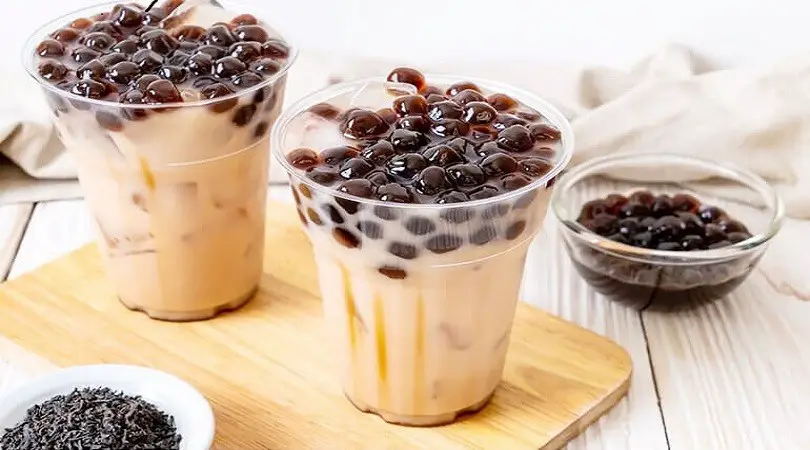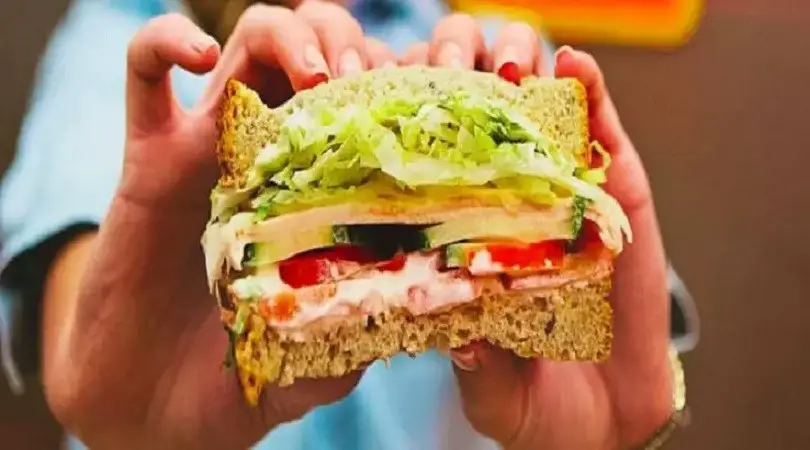Last Updated on January 6, 2025
Yes, you can have boba while pregnant, but it’s important to consume it in moderation. Here’s what you need to know.
Boba, also known as bubble tea, contains ingredients like tapioca pearls, tea, and milk or fruit flavors. While these ingredients are generally safe during pregnancy, it’s crucial to consider the sugar and caffeine content. Too much sugar is not recommended during pregnancy and excessive caffeine intake can have negative effects.
Therefore, it’s best to limit your boba consumption and opt for healthier alternatives like herbal tea or homemade smoothies. As always, it’s recommended to consult with your healthcare provider for personalized advice.

Credit: www.pregnancyfoodchecker.com
Related: Can You Have Soy Sauce When Pregnant?
Understanding The Safety Of Boba Tea During Pregnancy
For many expecting mothers, one of the most common concerns is determining what foods and drinks are safe to consume during pregnancy. Boba tea, with its unique combination of flavored tea, milk, and chewy tapioca pearls, has gained popularity in recent years.
But is it safe to indulge in this sweet treat while pregnant? Let’s delve into the safety of boba tea during pregnancy and explore any potential risks associated with its consumption.
What Is Boba Tea?
Boba tea, also known as bubble tea, originated in taiwan in the 1980s and has since gained worldwide popularity. This tasty beverage is typically made by combining flavored tea (such as black or green tea), milk, sweeteners, and tapioca pearls.
The pearls are usually made from cassava root starch and add a unique chewy texture to the drink, making it a delight for many.
Despite its widespread appeal, it is essential to consider the safety aspects of consuming boba tea during pregnancy. Let’s take a closer look.
Is It Safe To Consume Boba Tea During Pregnancy?
The safety of consuming boba tea during pregnancy is a topic of debate among health experts. While no explicit studies exist on the effects of boba tea during pregnancy, it is crucial to consider its individual components.
Flavored Tea And Milk:
- Boba tea is typically made with flavored tea and milk, both of which are generally safe for pregnant women to consume.
- However, certain types of teas, such as herbal teas, should be consumed in moderation during pregnancy. It is advisable to consult with your healthcare provider regarding specific teas to avoid.
- Milk, on the other hand, is an excellent source of calcium, which is vital during pregnancy. Opting for pasteurized milk will ensure optimal safety.
Sweeteners:
- Boba tea often contains sweeteners like sugar or honey. While small amounts of these sweeteners are usually safe during pregnancy, it is important to watch your overall sugar intake for health reasons.
- Moderation is key when enjoying boba tea as the added sweeteners can contribute to excess calorie consumption.
Tapioca Pearls:
- The chewy tapioca pearls are a signature element of boba tea. They are generally safe to consume during pregnancy.
- However, it is essential to ensure that the tapioca pearls are cooked thoroughly, as undercooked tapioca can pose a risk of foodborne illnesses.
Potential Risks Associated With Boba Tea Consumption During Pregnancy
While boba tea can be enjoyed in moderation during pregnancy, it is essential to be aware of the potential risks that may arise from certain factors. These risks include:
- Excessive caffeine intake: Some varieties of boba tea may contain high levels of caffeine. It is advisable to limit caffeine intake during pregnancy to avoid potential adverse effects on the developing fetus.
- Sugar content: Boba tea often contains high amounts of sugar, which can contribute to weight gain and increase the risk of gestational diabetes if consumed in excess. It is important to be mindful of your overall sugar intake during pregnancy.
- Foodborne illnesses: Improperly cooked or stored tapioca pearls can lead to foodborne illnesses, which can be harmful during pregnancy. It is crucial to ensure that boba tea is prepared and handled hygienically.
Consuming boba tea during pregnancy can be safe if enjoyed in moderation and with consideration for the potential risks associated with its consumption. It is always recommended to consult with your healthcare provider for personalized advice and guidelines regarding your food and beverage choices during pregnancy.
Related: Can You Play Volleyball While Pregnant?
Nutritional Considerations For Pregnant Women
Pregnancy is a time when proper nutrition is crucial for the health and development of both the mother and the baby. As an expecting mother, you may have questions about what foods and beverages are safe for consumption during pregnancy.
One popular drink that often comes to mind is boba tea. While it can be tempting to indulge in this delicious beverage, it is important to consider its nutritional content and how it fits into your overall pregnancy diet. Let’s explore the essential nutrients needed during pregnancy, evaluate the nutritional content of boba tea, and discuss how it can be incorporated into a healthy pregnancy diet using the following headings:
Essential Nutrients Needed During Pregnancy
Maintaining a balanced diet during pregnancy is vital to support the growth and well-being of both the baby and the mother. Here are the key essential nutrients that pregnant women should focus on:
- Folate: Folate, also known as folic acid, plays a crucial role in the development of the baby’s neural tube. It is found in foods such as leafy green vegetables, beans, and fortified cereals.
- Iron: Iron is essential for the production of red blood cells and oxygen transport. Pregnant women need increased iron intake to prevent anemia. Good sources of iron include lean meats, legumes, and fortified grains.
- Calcium: Calcium is necessary for the development of the baby’s bones and teeth. Dairy products, fortified plant-based milks, and dark leafy greens are excellent sources of calcium.
- Omega-3 fatty acids: Omega-3s are important for the baby’s brain and eye development. They can be found in fatty fish like salmon, chia seeds, and walnuts.
- Vitamin d: Vitamin d helps the body absorb calcium and is crucial for bone health. It can be obtained through sunlight exposure and foods like fatty fish, fortified dairy products, and eggs.
Evaluating The Nutritional Content Of Boba Tea
Now let’s examine the nutritional content of boba tea to understand its potential benefits and drawbacks during pregnancy:
- Calories: Boba tea is often high in calories, primarily due to the added sugars and tapioca pearls. Opting for a smaller serving size or choosing a lower sugar option can help moderate calorie intake.
- Sugar: The added sugars in boba tea can contribute to excessive weight gain and increase the risk of gestational diabetes. Considering alternatives with reduced sugar content or natural sweeteners can be a healthier choice.
- Caffeine: Some types of boba tea contain caffeine, which should be consumed in moderation during pregnancy. Excessive caffeine intake has been associated with adverse effects on fetal development. Opt for decaffeinated versions or limit caffeine intake from other sources.
How Boba Tea Fits Into A Healthy Pregnancy Diet
While indulging in boba tea occasionally is unlikely to cause harm, it is important to incorporate it wisely into a balanced pregnancy diet:
- Moderation: Enjoy boba tea as an occasional treat rather than a daily beverage. This ensures that you limit the intake of excess calories, sugars, and caffeine.
- Customization: Opt for healthier options, such as using low-fat or plant-based milk, reducing sweeteners, or choosing herbal or decaffeinated versions of boba tea.
- Hydration: Remember to prioritize water as your primary source of hydration during pregnancy. Drinking adequate water helps to meet the increased fluid needs and supports overall health.
Boba tea can be a fun and tasty treat to enjoy during pregnancy, as long as it is consumed in moderation and with attention to its nutritional content. However, it is always advisable to consult with your healthcare provider to ensure that it aligns with your specific dietary needs and overall health goals during this precious time.
Identifying Safe Boba Tea Options For Pregnant Women
Boba tea, also known as bubble tea, is a delightful and refreshing beverage enjoyed by many. However, if you’re pregnant, you may have concerns about whether it is safe to consume during this special time. In this section, we will discuss some important considerations to help you identify safe boba tea options that you can enjoy while pregnant.
Choosing A Reputable Boba Tea Establishment
When it comes to choosing a boba tea establishment, it’s crucial to prioritize your health and safety. Here are key points to consider:
- Look for a reputable establishment: Opt for a well-established boba tea shop with a good reputation for cleanliness and quality.
- Check for proper food handling practices: Ensure that the establishment adheres to strict food safety guidelines, including proper hygiene practices and ingredient handling.
- Read reviews and customer feedback: Take the time to read reviews from other customers to gauge their experiences with the establishment’s safety standards and overall quality.
Avoiding Certain Ingredients Or Additives In Boba Tea
To ensure the safety of your boba tea consumption during pregnancy, it is wise to avoid certain ingredients or additives. Consider the following points:
- Caffeine intake: Limit your caffeine intake to a moderate level during pregnancy. Boba teas may contain tea or coffee, which can contribute to your overall caffeine consumption. Opt for decaffeinated options or ask for reduced levels of tea or coffee.
- Artificial sweeteners: Some boba teas may contain artificial sweeteners that could potentially be harmful to you and your baby. Avoid boba teas with these additives and opt for natural sweeteners like honey or fruit juices.
- Tapioca pearls: While tapioca pearls are the highlight of boba tea, it is essential to ensure they are cooked properly. Inadequately cooked pearls may pose a risk of foodborne illnesses. Choose establishments that prioritize thorough cooking and appropriate hygiene practices.
Homemade Boba Tea Recipes For Pregnant Women
If you prefer to enjoy boba tea in the comfort of your own home, you can create safe and delicious homemade versions. Consider the following tips:
- Use high-quality ingredients: Choose fresh and natural ingredients for your boba tea, like organic tea leaves, fresh fruit, and high-quality tapioca pearls.
- Control your sugar levels: Adjust the sweetness level according to your preference by using natural sweeteners or reducing the amount of sugar in the recipe.
- Experiment with flavors: Get creative with flavors by adding fresh herbs or infusing your tea with natural extracts like vanilla or lavender.
Remember, always consult your healthcare provider before making any dietary changes or consuming boba tea while pregnant. By choosing a reputable boba tea establishment, being mindful of certain ingredients, and exploring homemade recipes, you can safely enjoy the occasional boba tea during your pregnancy journey.
Related: Can I Pop My Back While Pregnant?
Moderation And Consultation: Key Factors For Safe Consumption
Moderation Guidelines For Drinking Boba Tea While Pregnant
When it comes to enjoying boba tea during pregnancy, moderation is key. While it is generally safe to consume boba tea in small amounts, it is important to follow these guidelines to ensure a healthy and safe experience for both mom and baby:
- Limit your intake: It is recommended to consume boba tea in moderation, limiting yourself to one serving per day or less. This will help you avoid excessive caffeine and sugar intake, which can have negative effects on your pregnancy.
- Watch your caffeine intake: Boba tea typically contains black tea, which contains caffeine. Too much caffeine can increase the risk of complications during pregnancy, such as premature birth or low birth weight. It is important to keep your total daily caffeine intake below 200 mg. to put things into perspective, an average cup of boba tea contains around 60-70 mg of caffeine.
- Choose decaffeinated options: If you’re concerned about your caffeine intake, opt for decaffeinated boba tea. Many boba tea shops offer decaffeinated versions of their popular flavors, allowing you to enjoy your favorite drink without the caffeine.
- Be mindful of sugar content: Boba tea usually contains added sugar, which can contribute to excessive weight gain and gestational diabetes. It is important to choose drinks with lower sugar content or ask for less sweetener in your boba tea. Additionally, you can request alternative sweeteners like honey or stevia.
- Hydration is key: Remember to stay hydrated by drinking plenty of water alongside your boba tea. This will help prevent dehydration and ensure the proper functioning of your body during pregnancy.
The Importance Of Consulting Healthcare Professionals
Consulting healthcare professionals is essential when considering the consumption of boba tea during pregnancy. Each pregnancy is unique, and individual circumstances can greatly impact what is considered safe or appropriate. Here are a few reasons why professional guidance is important:
- Health conditions: If you have any underlying health conditions or pregnancy complications, it is crucial to consult your healthcare provider before consuming boba tea. They will be able to provide personalized advice based on your specific health situation.
- Allergies and sensitivities: Some individuals may have allergies or sensitivities to certain ingredients found in boba tea. It is important to discuss any potential allergies or sensitivities with your healthcare provider to ensure safe consumption.
- Medication interactions: If you’re taking any medications during pregnancy, it is important to check with your healthcare provider if boba tea consumption could potentially interact with them. Certain ingredients in boba tea may interfere with the absorption or effectiveness of certain medications.
- Overall well-being: Your healthcare provider is there to support you and ensure the well-being of both you and your baby. By discussing your boba tea consumption with them, they can provide personalized recommendations and guidelines tailored to your specific needs.
Remember, everyone’s pregnancy journey is different, and what may be safe for one person may not be for another. Always consult your healthcare provider for individualized advice and guidance regarding the consumption of boba tea during pregnancy.
Frequently Asked Questions Of Can I Have Boba While Pregnant?
Can I Drink Boba Tea While Pregnant?
Boba tea is safe to consume during pregnancy, but moderation is key due to its caffeine and sugar content.
Is It Safe To Have Boba Pearls During Pregnancy?
Having boba pearls in moderation during pregnancy is generally safe, but it’s advisable to check the ingredients and quality.
What Are The Risks Of Having Boba While Pregnant?
Excessive consumption of boba tea can lead to increased caffeine intake, gestational diabetes risk, or potential allergen exposure.
Are There Any Alternatives To Boba Tea During Pregnancy?
If you want a boba-like experience without the risks, consider herbal tea, fruit-infused water, or decaffeinated beverages.
How Can I Enjoy Boba Responsibly During Pregnancy?
Opt for options with less sugar, choose decaffeinated or half-caffeinated options, and limit your consumption to moderate amounts.
Conclusion
It is safe for pregnant women to enjoy boba tea in moderation. Boba tea, made from ingredients like black or green tea, tapioca pearls, and milk, can be a refreshing and enjoyable treat during pregnancy. However, pregnant women should be mindful of the caffeine content in the tea and opt for decaffeinated versions or limit their consumption.
Additionally, it is important to choose a reputable boba tea shop that follows proper hygiene and food safety practices to minimize any potential risks. Consulting with a healthcare provider or midwife is always recommended to ensure that boba tea is suitable for individual circumstances.
Remember, moderation is key, and being aware of your own body’s needs and tolerances is important. So go ahead, indulge in a delicious boba tea, savor the flavors, and enjoy this special time in your life.











